
Isle Royale National Park is an American national park consisting of Isle Royale and more than 400 small adjacent islands, as well as the surrounding waters of Lake Superior, in the state of Michigan. Isle Royale is 45 mi (72 km) long and 9 mi (14 km) wide, with an area of 206.73 sq mi (535.4 km2), making it the fourth-largest lake island in the world. In addition, it is the largest natural island in Lake Superior, the second-largest island in the Great Lakes, the third-largest in the contiguous United States, and the 33rd-largest island in the United States.

M-26 is a 96.355-mile-long (155.068 km) state trunkline highway in the U.S. state of Michigan, running from two miles (3.2 km) east of Rockland to its junction with US Highway 41 (US 41) in Copper Harbor. It generally runs southwest-to-northeast in the western half or Michigan's Upper Peninsula. The northernmost segment, which closely parallels the shore of Lake Superior on the west side of the Keweenaw Peninsula, is highly scenic.
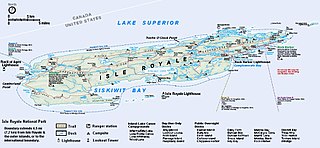
Rock Harbor is the main access point for visitors landing on Isle Royale in northern Lake Superior. It sits four miles (6.4 km) from the northeastern end of the 45-mile-long (72 km) island, the whole of which is protected as Isle Royale National Park. Two structures in Rock Harbor—the Rock Harbor Light and the Edisen Fishery—are listed on the National Register of Historic Places.

The following is a list of Registered Historic Places in Keweenaw County, Michigan.
This National Park Service list is complete through NPS recent listings posted August 5, 2022.

USS Puritan, a civilian transport built by Craig Shipbuilding Company in Toledo, Ohio, was launched in 1901, and lengthened by 26 ft (7.9 m) in 1908. The ship sailed on the Great Lakes in passenger service, was purchased by the U.S. Navy at the end of the war, and returned to passenger service after the war. The ship sank in 1933 near Isle Royale in Lake Superior, and its wreck is listed on the National Register of Historic Places.
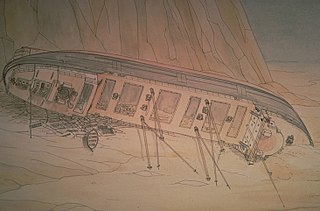
SS Kamloops was a Canadian lake freighter that was part of the fleet of Canada Steamship Lines from its launching in 1924 until it sank with all hands in Lake Superior off Isle Royale, Michigan, United States, on or about 7 December 1927.

The Rock of Ages Light is a U.S. Coast Guard lighthouse on a small rock outcropping approximately 2.25 miles (3.62 km) west of Washington Island and 3.5 miles (5.6 km) west of Isle Royale, in Eagle Harbor Township, Keweenaw County, Michigan. It is an active aid to navigation.
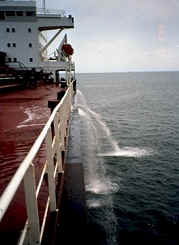
Ballast water discharges by ships can have a negative impact on the marine environment. The discharge of ballast water and sediments by ships is governed globally under the Ballast Water Management Convention, since its entry into force in September 2017. It is also controlled through national regulations, which may be separate from the Convention, such as in the United States.

The Isle Royale Ferry Service was the name of the transportation service between Copper Harbor, Michigan and Isle Royale National Park from 1971 to about 2004. The service became the Isle Royale Line, Inc. in about 2005, when the company began operating the Isle Royale Queen IV. Passenger ferry operations out of Copper Harbor, Michigan's northernmost town, which has often been known as the "Gateway to Isle Royale" have been operating since 1930 under different ownerships. Six ferry boats have been in operation since the first charters out of Copper Harbor in the 1930s. The ferry services to the national park are what have brought many of the tourists to the small town of Copper Harbor.

Isle Royale Queen IV is a passenger ferry operating on Lake Superior between Copper Harbor, Michigan, and Isle Royale National Park, the largest island on Lake Superior and the State of Michigan's only national park. The ferry operates from mid-May to the end of September each year. In the months of June, July, and August the ferry operates nearly every day. The crossing distance between the port of Copper Harbor and the Smithwick Channel entrance to Rock Harbor at Isle Royale is 53.9 miles (86.7 km). The Queen IV makes this crossing in three hours, fifteen minutes, depending on weather conditions on Lake Superior.
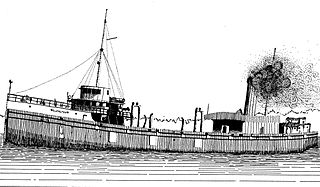
The Glenlyon was a freighter built in 1893; it was sunk off the shore of Isle Royale in Lake Superior in 1924 and the remains are still on the lake bottom. The wreck was placed on the National Register of Historic Places in 1984.

Algoma was a screw steamer built in 1883. She sank off Mott Island near Isle Royale in Lake Superior in 1885 and some of her remains are still on the lake bottom. The wreck was placed on the National Register of Historic Places in 1984.

America was a packet boat transporting passengers, mail, and packages between settlements along the North Shore of Lake Superior, an inland sea in central North America. Built in 1898, America sank in Washington Harbor off the shore of Isle Royale in 1928, where the hull still remains. The wreck was placed on the National Register of Historic Places in 1984.

The Cumberland was a wooden-hulled side paddlewheeler built in 1871; it was wrecked off the shore of Isle Royale in Lake Superior in 1877 and the remains are still on the lake bottom. The wreck was placed on the National Register of Historic Places in 1984.

The Henry Chisholm was a wooden freighter; it was sunk off the shore of Isle Royale in Lake Superior in 1898 and the remains are still on the lake bottom. The wreck was placed on the National Register of Historic Places in 1984.

SS Monarch was a passenger-package freighter built in 1890 that operated on the Great Lakes. She was sunk off the shore of Isle Royale in Lake Superior in 1906 and the remains of her wreck and cargo are still on the lake bottom. The wreck was placed on the National Register of Historic Places in 1984.

Due to its unique geography, being made of two peninsulas surrounded by the Great Lakes, Michigan has depended on many ferries for connections to transport people, vehicles and trade. The most famous modern ferries are those which carry people and goods across the Straits of Mackinac to the car-free Mackinac Island but before the Mackinac Bridge was built, large numbers of ferries carried people and cars between the two peninsulas. Other ferries continue to provide transportation to small islands and across the Detroit River to Canada. Ferries once provided transport to island parks for city dwellers. The state's only national park, Isle Royale cannot be reached by road and is normally accessed by ferry. The largest ferries in Michigan are the car ferries which cross Lake Michigan to Wisconsin. One of these, the SS Badger is one of the last remaining coal steamers on the Great Lakes and serves as a section of US Highway 10 (US 10). The Badger is also the largest ferry in Michigan, capable of carrying 600 passengers and 180 autos.
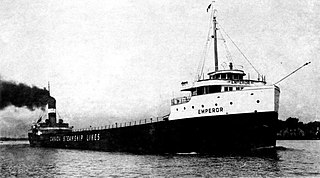
SS Emperor was a steel-hulled Canadian lake freighter in service between 1911 and 1947. She was built between 1910 and April 1911 by the Collingwood Shipbuilding Company in Collingwood, Ontario, for Inland Lines, Ltd. of Midland, Ontario. She entered service on May 3, 1911. Emperor was sold to Canada Steamship Lines of Montreal, Quebec. Under the ownership of Canada Steamship Lines, she carried a wide variety of cargoes, but most frequently iron ore to Point Edward, Ontario, where it would be transported to Hamilton, Ontario, by train. After the opening of the fourth Welland Canal, Emperor carried the ore straight to Hamilton. She was involved in several accidents throughout her career.

















